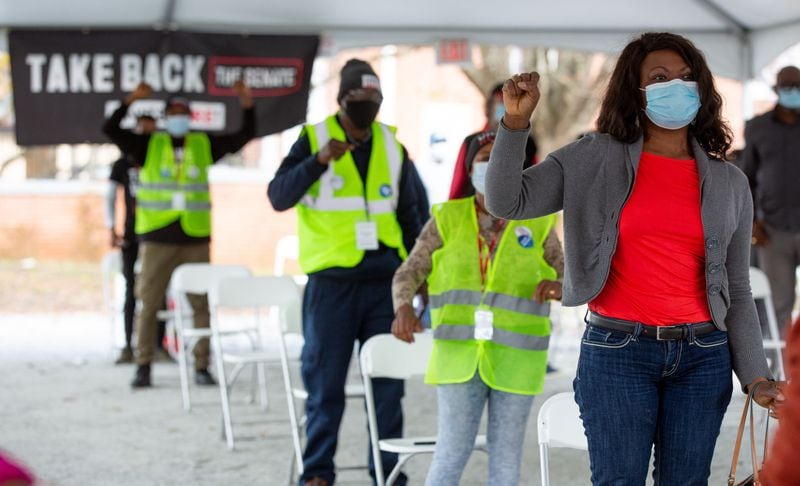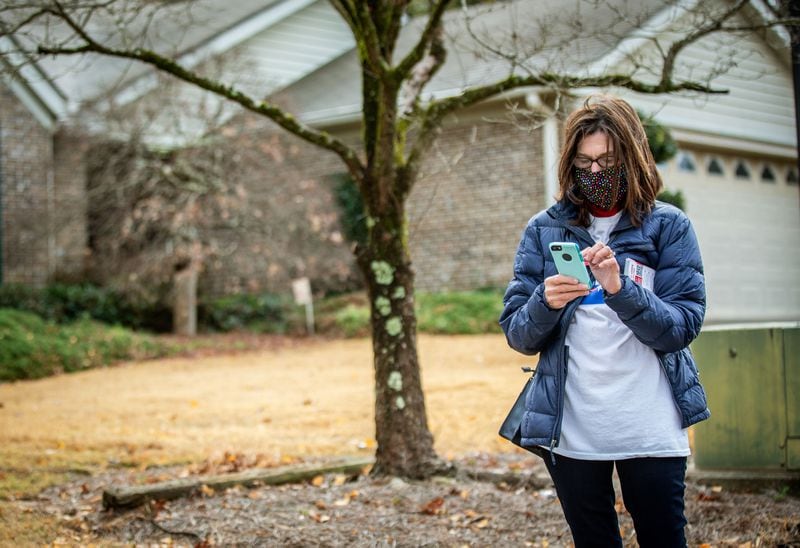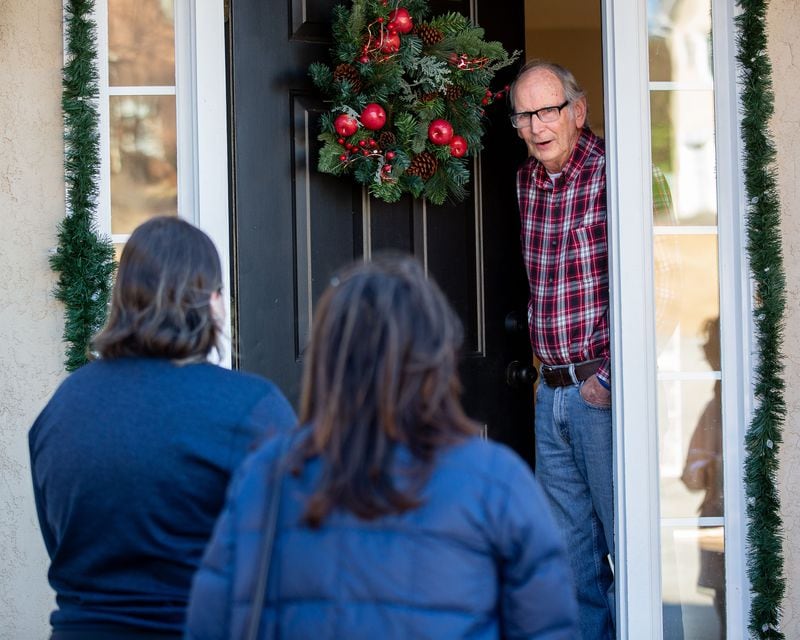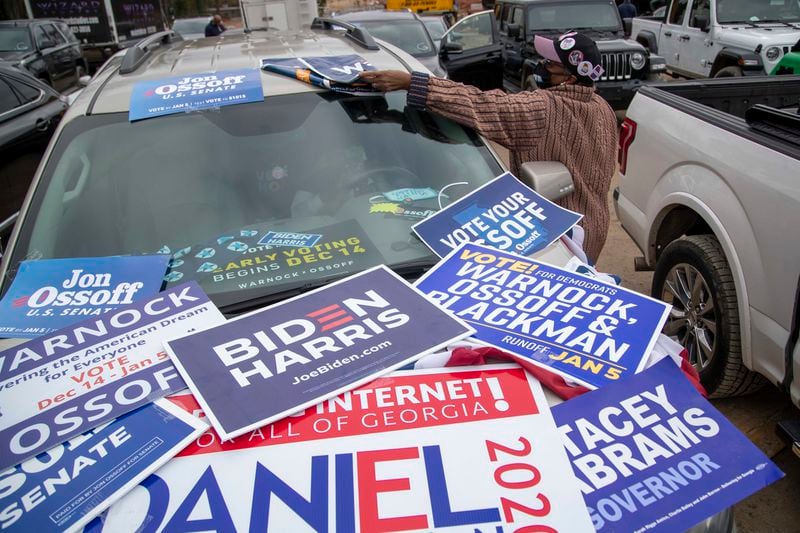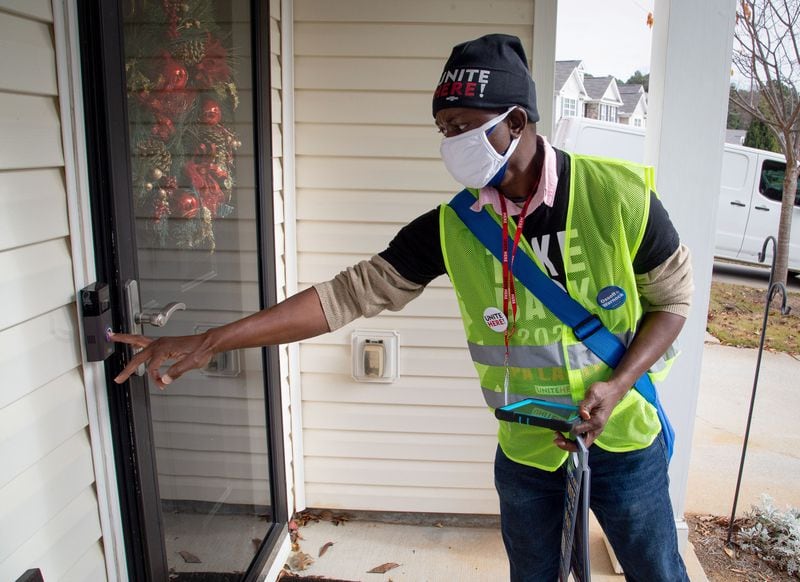On a frigid weekday morning, Claudia Eisenburg wielded her smartphone like a compass pointing her toward the next household in Peachtree City where she’d find voters likely to back the Republican candidates in next month’s U.S. Senate runoffs.
She’s become something of an expert on voter canvassing, estimating that she and six friends from the Fayette County GOP have knocked on roughly 4,000 doors since July. But with Jan. 5 contests determining control of the Senate, each trip to a doorstep has taken on new urgency.
Two days earlier in Clarkston, roughly three dozen African immigrants, many furloughed or laid-off hospitality workers, fanned out for their own ambitious goal: To encourage the roughly 40,000 African-born Georgians to vote for Democrats Jon Ossoff and Raphael Warnock.
“Don’t just see yourselves as canvassers. See yourselves as agents for change,” Tefere Gebre, the Ethiopian-born executive vice president of the AFL-CIO labor unions, told the canvassers. “You are the future, brothers and sisters.”
Credit: Steve Schaefer
Credit: Steve Schaefer
The dueling grassroots efforts were but a snapshot of the enormous effort both political parties, and their allies, have put behind the push to turn out voters for the runoffs.
More than $440 million has been spent or reserved on TV and radio ads ahead of the critical runoffs, smashing state records for political spending. But the quieter, painstaking work building vast get-out-the-vote operations could wind up being far more significant.
“You’ve got to catch people — and not let them forget that there is an election,” said Karen Owen, a University of West Georgia political scientist. “The political ads are not doing it.”
The turnout operations play an outsized role in an election with such unusual dynamics. The candidates must compete for attention with the holiday season and voters already worn out by the political back-and-forth.
And President Donald Trump has complicated the case for U.S. Sens. David Perdue and Kelly Loeffler by continuing to falsely claim the election is “rigged,” raising concerns that some of his disillusioned loyalists could stay home.
Turnout in statewide runoffs, which have long favored Republicans, tends to be significantly lower than in general election contests. But with control of the U.S. Senate in the balance, Georgians are rushing to the polls in unprecedented numbers for an overtime cycle.
As of Thursday, more than 1,000,000 Georgians have already cast their ballots, either by mail or in person. And legions of canvassers from both parties armed with smartphone apps and fine-tuned scripts are targeting the likeliest of voters to coax them to vote again.
Credit: Steve Schaefer
Credit: Steve Schaefer
Beefing up operations
Earlier this year, Republicans had built a decided ground-game advantage in Georgia. After a brief coronavirus-related hiatus, GOP campaigns began returning to the field in force in June to knock on doors and contact voters in person, while Democrats relied mainly on remote efforts such as virtual events, phone calls and text messages.
But with the extraordinary stakes of the runoffs, the two Democratic Senate campaigns and their allies decided to transition back to in-person canvassing in November with safety precautions such as social distancing and mask requirements in place.
Both campaigns have plenty of reasons to hit the streets again. Democrats need to directly appeal to moderate and independent-leaning voters who cast their ballot for Joe Biden, now the president-elect, but voted GOP down the ticket.
And Republicans must persuade Trump’s most loyal supporters to cast another ballot even though he’s not on the ticket — and even as he wars with state GOP officials who refused his demand to overturn his election defeat.
The two political parties are devoting enormous resources to the races: The Republican National Committee said 600 paid staff previously deployed to other battleground states were shifted to Georgia, part of an effort that will top $20 million on the two races.
Credit: Steve Schaefer
Credit: Steve Schaefer
Combined with the National Republican Senatorial Committee and the Loeffler and Perdue campaigns, the GOP has built up what it called a “presidential-level voter-contact operation” with 1,000 paid staff members working in 21 regions around the state.
“This is the largest GOP ground-game operation in the history of Georgia politics,” said RNC spokesperson Savannah Viar.
Democrats have kept the details of their operation closer to the vest, including the number of paid staffers the party has deployed on the ground. But a spokeswoman said the coordinated effort between the Democratic Senatorial Campaign Committee, Warnock, Ossoff and the Democratic Party of Georgia has reached out to more than 1.5 million Georgians in the last week through door-knocking, phone calls and texts, and that more than 20,000 people have signed up for a volunteer shift for the runoff.
Warnock’s campaign said its volunteers made more than a half-million calls to voters in the last week, while Ossoff’s said it made a similar number last weekend alone to ensure voters had a plan to head to the polls.
Vast impact
Those vast efforts don’t include the constellation of outside groups weighing in.
Just this week, left-leaning groups announced a “vote tripling” program that places volunteers outside polling places to ask voters to immediately remind three friends to vote. The word-of-mouth strategy, they believe, could prove a more effective approach than traditional appeals.
“If you ask people to remind 10 friends to vote, they’ll remind zero,” said Robert Reynolds, the head of the Vote Tripling Action Fund. “But if you ask them to remind three, they’ll remind three.”
The Fair Fight voting rights group founded by Stacey Abrams has taken a range of steps to reengage voters, including sending holiday magnets to more than 1 million Georgia households featuring a to-do list reminding them to vote.
And Georgians departing Biden’s Atlanta event on Tuesday might have seen strategically placed billboards from RelationPAC seizing on the party’s support for more generous stimulus checks: “Vote Democrat. Get $1,200.”
“Republicans won down-ticket in November with blunt messages warning Democrats were defunding the police and closet socialists. We should be really direct, too, and say if you vote Democrat, you’re going to get a check,” said Jon Jones, a former Barack Obama strategist who is placing the signs in heavily Democratic neighborhoods.
Credit: Alyssa Pointer / Alyssa.Pointer@ajc.com
Credit: Alyssa Pointer / Alyssa.Pointer@ajc.com
The Republicans are leaning heavily, too, on outside groups — particularly faith-based organizations. The Faith and Freedom Coalition boasts 1,289 paid staff and volunteers devoted to canvassing in person or by phone. In early November, the goal was to visit 400,000 evangelical households. Now the bar has risen to 600,000.
Over the years, the conservative group has honed its routine. Canvassers not only leave behind flyers to voters who aren’t home, but they also send them texts and voicemail messages.
“There’s no question this is the most muscular and robust ground game in the faith community that we’ve ever seen in this state,” said Ralph Reed, the coalition’s founder.
The canvassers aren’t taking a stab in the dark to reach out to voters. They are relying on sophisticated party databases that pull information from sources that include state voter records, online consumer data and, sometimes, survey details.
That data includes voter details such as race and age demographics, past participation in elections and even their credit history and purchasing patterns. Those details drive algorithms that score voters on how likely they are to back one ticket or another. They can also help canvassers intensely target smaller groups such as undecided voters who previously voted Republican.
Jenkins Kolongbo, a canvasser from UNITE HERE, relied on his tablet to identify the homes of naturalized African immigrants in a Scottdale complex, knocking twice on front doors before leaving shiny door hangers touting Ossoff and Warnock’s stances on health care and COVID relief.
Credit: Steve Schaefer
Credit: Steve Schaefer
A native of Liberia, Kolongbo got his feet wet on the campaign trail in 2018, as U.S. Sen. Bob Menendez, D-N.J., ran for a third term. After he was furloughed from his airline job in New Jersey due to the pandemic, he joined UNITE HERE’s efforts to support the Democrats — and punish Republicans he said have “abandoned their responsibility” to immigrants and working families — in Florida and now in Georgia.
Eisenburg, the Peachtree City GOP canvasser, had never knocked on doors until this year.
The lifelong metro Atlanta resident first got involved in politics about 15 years ago, when Delta Air Lines moved to terminate its pension plan for its pilots, jeopardizing her husband’s retirement. But in 2020, she was driven by a new, urgent concern that “more socialism, more government control” would come if Democrats flipped control of the Senate.
“Whoever gets elected — I’m almost 70 years old — won’t impact my life,” said Eisenburg, “but it will impact my children and my children’s children.”


